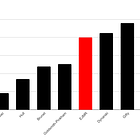Florian Ederer: the next Fiona Scott Morton?
The EU is preparing to nominate a grey hat hacker as their next Chief Economist for Competition. Rather than give him a plum job, I argue the EU should give him a massive fine, or arrest him.
Last month, Fiona Scott Morton, the Theodore Nierenberg Professor of Economics at the Yale School of Management, and Barack Obama’s former chief economist at the U.S. Department of Justice, was nominated to be Europe’s top antitrust economist — formally, her title would’ve been, “Chief Economist of EU’s Directorate-General for Competition.”
Unfortunately, Scott Morton grew up in Massachusetts, and thus was deemed not European enough (not European at all). Therefore, despite being supremely qualified, French President Emmanuel Macron told reporters he was "skeptical" about the nomination and said the move was not "coherent" with Brussels' strategic autonomy goals, “"It implies we have a very serious problem with all the academic systems in Europe … Is there really no great European researcher with academic qualifications that could do this job?” Macron asked at an EU summit.
Scott Morton dropped out of the race the next week.
"Given the controversy that has arisen because of the selection of a non-European to fill this position, and the importance that the Directorate General has the full backing of the European Union as it enforces, I have determined that the best course of action is for me to withdraw and not take up the Chief Economist position," Scott Morton said in a statement.
Enter Florian Ederer
He’s Austrian; he’s an economist, but he’s definitely not an Austrian economist.
Also, he has a pretty nice body. Respect.
Well, technically, he’s an Austrian-American dual-citizen, which is funny because the previous nominee was disqualified for being American, and they replaced her with another American. The news that Ederer was the frontrunner to replace Scott Morton first broke on Politico! on August 3rd. “For now, though, Ederer is the only known candidate.”
The Politico article begins by praising him, but ends by throwing shade. This is code for “he is widely perceived as a sociopathic, narcissistic, and Twitter-addicted attention whore.”
Perhaps most importantly, he seems to relish the limelight — which is not a given, as competition economists were used to toiling in obscurity until relatively recently.
— Politico
The sociopathy and narcissism is not the beef that I have with him, though.
Nor are his qualifications.
Despite failing tenure at Yale last month (it’s really, really, really hard to get tenure at Yale; last month Florian transitioned from untenured to Yale to tenured at Boston University, a downgrade from #16 to #119 in the RePeC Business School rankings), he is plenty qualified for the gig, on paper. His CV is impressive and he publishes extensively in top journals on the topic of antitrust. These relevant qualifications stand in stark contrast to, say, Lisa Cook, who spent her entire career writing about microeconomic racial grievances, and then got up in front of the Senate Banking Committee and bragged that she spent her entire career studying monetary macroeconomics, lying through her teeth to the point where an honest government would prosecute her for perjury.
Okay, so, he is qualified on paper, but would he make a good chief economist?
What are his antitrust policies?
Well, I don’t know.
So I reached out to an expert:
Ederer is apparently sympathetic to arguments that competition policy should protect labor markets and consumers. At least, he is hesitant to use competition policy to further environmental goals, but I consider his stance to be already bad enough. The goal of competition policy should be to safeguard competition, in the sense that there should be no legal barriers to entry to a market.
Over the years, the European Commission has been neglecting its core business to go after EU member states that shower state aid to their favorite companies, thereby causing unfair competition.
Instead, the Commission has been enthusiastically pushing "antitrust" policies, whereby it attempts to define whether there is sufficient competition in a certain market, which is ultimately an arbitrary assessment, as it strongly depends on how to define a market. Do you look at the market for bananas or the market for fruit, for example? In my view, antitrust action should be abolished. If there is not enough competition in a market, newcomers will enter that market to try to profit, but then legal barriers to entry need to be scrapped, something which the EU Commission neglects.
Also, the Commission has been trying to redefine tax rulings as unfair state aid, even if these tax rulings - arrangements whereby companies would be certain of a certain tax rate - were open to any company. This was the reason why former U.S. President Trump dubbed EU Competition Commissioner Vestager the "tax lady", as she was mainly going after American companies. Vestager is now on her way out, but to have more proponents of politicising competition policy in the European Commission is simply bad news for European consumers. They profit from fair competition driving down prices, not from turning competition policy into yet another form of arbitrary political-driven regulation.
— Pieter Cleppe, EIC of Brussels Report
Okay, so maybe Ederer’s policies do suck.
Even if his policies do suck — again, I am not qualified to say, but it looks like they do — my beef is that he is a malicious hacker who hates free speech and openly flouts the EU’s laws. This should be the EU Commission’s beef with him, too, and is the main reason I am writing this article, in the hopes that it is passed around in Brussels so that they are notified of his grey-hat hacking. Brussels: you should be prosecuting him, not hiring him.
Please, if you know any bureaucrats in Brussels, share this article:
I reached out to Dr. Ederer for this article but did not receive a response.
The Hack
I am not going to rehash Ederer’s hack, because I have already written 7 articles about it! For the convenience of Brussels bureaucrats reading this article I will summarize them each in 50 words using ChatGPT below… if you read these articles, dear bureaucrats, and you came to a different conclusion than I came to, then we are living in different worlds.
In short: Ederer brute-force hacked into a website (https://www.econjobrumors.com/) and stole millions of IP addresses (IP addresses are private information under GDPR), compromising the anonymity of an untold number political dissidents, closeted gays, suicidal individuals, and his personal enemies. Many of this site's users are EU citizens. Stealing millions of IP address by brute force, when they are clearly meant to be hidden, and are linked to sensitive personal posts, quite blatantly violates EU residents’ GDPR rights.
The hack is incredibly easy to understand. This is not rocket science. Here is a link to ~200 pages of economists discussing it on the forum that was hacked. Here is the analogy that is commonly used to describe it: “it’s like cracking bike locks with brute force and then claiming that the brute-force unlocking of a bike lock is OK because the lock was sitting out in the open … it's a completely idiotic line of reasoning that would never be accepted by those spouting it if it wheren't for the fact that they fundamentally like this specific instance of hacking and are grasping at straws to justify it.”
Yale professor Florian Ederer tweeted an abstract suggesting he can identify users of econjobrumors.com (EJMR), causing controversy. Critics liken EJMR to 4chan for economists. Accusations of bias, inconsistencies in funding, and claims of academia's pettiness and scandals highlight the article's tone of disapproval of the academic elite.
Yale University researchers used a multi-step procedure to recover IP addresses from EJMR users. The research leaked, revealing they "cracked the hash" of users' posts, raising cybersecurity and privacy concerns. Many react critically, questioning the study's ethics and legality, especially its potential for doxxing. Some highlight European GDPR and US data retention limits as protective measures. The controversy grows as the mainstream media prepares to cover the story.
The connection between Mastodon, a platform moderated by a Yale professor, and EJMR reveals that both platforms share user IP data. The intent to 'doxx' users threatens anonymity and is viewed by some as hacking, with comparisons to illegal wiretapping. Concerns arise over exposure of whistleblowers and mentally ill users on EJMR, with potential consequences including retaliation and psychological distress.
An anonymous user compared EJMR's toxicity to Reddit, concluding that either EJMR is less toxic than popular belief, or the measuring classifier is ineffective. The discussion sparked further investigations into measuring toxicity on other platforms, like Twitter. There's rising concern about potential doxxing and misuse of the leaked data, with certain individuals explicitly expressing intentions to use this data maliciously.
Christopher Brunet reached 5,000 Substack subscribers, experienced a viral article spike. He's now a contributing editor at The American Conservative and is relocating to Europe, seeking a permanent home and considering family prospects. Brunet's ongoing EJMR hacking investigation led to a speaking opportunity at Stanford's Classical Liberalism seminar series, amongst notable figures.
Florian Ederer unexpectedly withdrew from a scheduled talk at Stanford, leading to speculation and debate. The writer emphasizes the importance of open discourse, critiquing the nature of some Q&A sessions, particularly one by Ederer which was poorly received and removed from the internet.
After being ghosted by Ederer, Christopher Brunet challenges Joshua Gans and Anya Samek to debate on EJMR's deplatforming. Gans, known for targeting EJMR's advertisers, declined the debate. Instead, he proposed Justin Wolfers. The author awaits Samek's response, who actively opposes EJMR and leads a censorship petition against it.
Dear EU bureaucrats, you should consider reading these 7 parts as essential due diligence. It will be neglectful to nominate Ederer without reading them.
If you still don’t believe it is a hack, here is a blog post from Tyler Cowen, a professor at George Mason University, which ends by saying:
“I believe the authors of the paper under consideration are behaving unethically, and I hope they will retract their work and then destroy it.”
— Tyler Cowen
Here is a second second blog post from Cowen:
The owner of EJMR agrees that this is a hack, according to an interview he gave to one mainstream outlet. In a groundbreaking move, the owner of EJMR used ChatGPT as a neutral arbiter of truth:
Asked for comment Wednesday afternoon, EJMR sent an email saying, “you may wish to consider what a neutral actor (ChatGPT) thinks about the study.”
EJMR’s email then includes a question to that artificial intelligence program: “Would reverse engineering partial hash codes of thousands of website users to get their IPs with brute force be considered hacking?” ChatGPT, according to the email, replied “Yes, that activity would certainly be considered hacking, and more specifically, it would be illegal and unethical.”
How does this hack violate the GDPR?
I am not an expert on GDPR, and I will not pretend to be.
Instead, I will point you towards threads from hundreds of economists discussing the GDPR breach; some may call this outsourcing lazy, I call it effective. These economists are too afraid to speak up under their real name (for fear of professional retribution from Ederer and his #EconTwitterMafia!), so I will elevate their voices. Most economists are qualified to talk about whether such a hacker is a good choice to be the EU's chief competition economist, and I think European economists deserve to be heard on this, even if they are anonymous.
Just as an aside, geolocation almost certainly contravenes GDPR
Reminder: Doxxing EJMR paper violates EU, UK, Hong Kong law (+ others)
Here are some highlights:
I will end the article here, with the hopes that someone reading this knows someone in Brussels. Please share:
If you read these threads and found them compelling, I urge you to submit a complaint (I would be surprised if they hadn't already received a bunch of GDPR complaint already, but more can’t hurt):
.









![Yale University vows to 'geolocate' most EJMR users [PART 1]](https://substackcdn.com/image/fetch/w_140,h_140,c_fill,f_auto,q_auto:good,fl_progressive:steep,g_auto/https%3A%2F%2Fsubstack-post-media.s3.amazonaws.com%2Fpublic%2Fimages%2Fe2921848-687a-4d6f-bdf8-d07ba7ea4be0_1343x647.png)
![Yale University vows to 'geolocate' most EJMR users [PART 2]](https://substackcdn.com/image/fetch/w_140,h_140,c_fill,f_auto,q_auto:good,fl_progressive:steep,g_auto/https%3A%2F%2Fsubstack-post-media.s3.amazonaws.com%2Fpublic%2Fimages%2Fc78f22d8-d4cc-4824-b42c-bbeb03e76224_760x441.png)



![Yale University vows to 'geolocate' most EJMR users [PART 6]](https://substackcdn.com/image/fetch/w_140,h_140,c_fill,f_auto,q_auto:good,fl_progressive:steep,g_auto/https%3A%2F%2Fsubstack-post-media.s3.amazonaws.com%2Fpublic%2Fimages%2F76691cdf-6718-4736-bdf0-0382832b77d8_540x304.gif)






















Dang, Chris. You're on fire lately. Good to see. Keep on burning.
An absolute legend.